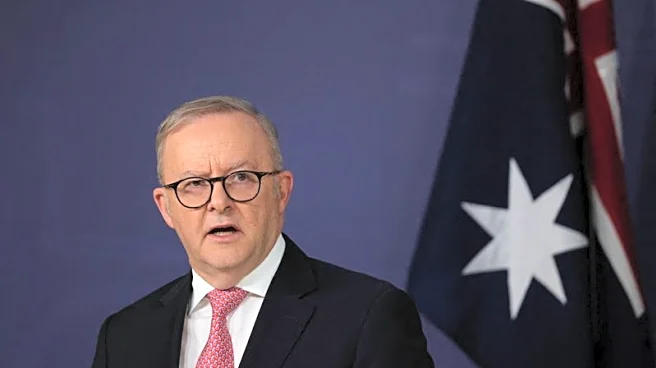By Kirsty Needham
SYDNEY (Reuters) -Australia's Prime Minister Anthony Albanese departs for the U.S. this week, raising expectations of a first meeting with President Donald Trump, where the AUKUS defence
partnership and China are likely to dominate talks between the security allies.
According to his office, Albanese departs on Saturday for the United Nations General Assembly in New York, where the prime minister said he will attend a reception hosted by Trump on Tuesday.
A bilateral meeting has not been announced, with Australian media outlets reporting a meeting "may" happen, cautious even after Trump said on Tuesday that Albanese would be coming for a visit to see him "very soon".
Executive director of the Lowy Institute think-tank, Michael Fullilove, said Australia's relationship with its principal security partner was "presently quite thin", because in the 10 months since Trump was elected, Albanese had not met him, and there was no U.S. ambassador to Australia.
"The main priority for Mr Albanese when he meets with President Trump will be to thicken up the relationship," he said.
Australia's former ambassador in Washington, Arthur Sinodinos, said King Charles had given AUKUS a "very strong plug" during Trump's UK visit, and it will be important for Albanese to get in-principle support directly from the president on the nuclear-powered submarine deal, to encourage investment.
In a dinner speech King Charles said AUKUS was a "vital collaboration" between Britain, the U.S. and Australia.
Designed to counter China's rapid naval build-up in the Indo-Pacific, AUKUS is under review by the Pentagon.
"The question is what new strings are attached to AUKUS," said Sinodinos, chairman of the United States Studies Centre.
GAZA, SOCIAL MEDIA BAN
At the U.N. General Assembly, Albanese will support Palestinian statehood, and speak at an event on Australia's law to ban social media for children aged under 16. Both positions are at odds with Washington's, with Trump broadly critical of foreign laws he says are unfair to U.S. tech companies.
Common ground includes the view that Western countries need to break China's dominance over the supply of critical minerals, Sinodinos said.
More than 20 Australian critical minerals companies met with Trump Administration officials this week to explore areas for collaboration.
On trade, Australia will urge Trump to adhere to a free trade agreement where a surplus runs in Washington's favour, officials said. They noted the 10% baseline tariff imposed on Australia was the best deal any country had struck.
Under pressure from Washington to increase defence spending, Australia on Saturday announced an extra A$12 billion ($8 billion) to upgrade a shipyard in Western Australia for AUKUS submarine maintenance.
Australia's ties in the militarily strategic Pacific Islands are a major interest for the U.S., Australian and U.S. officials have said.
The region's biggest aid donor, Australia faced a setback when security treaties in Vanuatu and Papua New Guinea that would have limited China's influence were left unsigned during Albanese's visits to each country this month.
China's embassy in Papua New Guinea wrote in a Facebook post on Friday it opposed exclusive treaties that "restrict or prevent a sovereign country from cooperating with a third party".
"Other players are seeking to take advantage of any perception of lack of interest, particularly by the U.S., and Australia and New Zealand in our backyard," said Sinodinos.
(Reporting by Kirsty Needham in Sydney; Editing by Lincoln Feast.)










